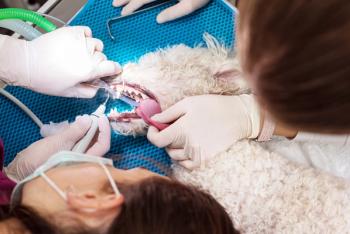
Mind Over Miller: Stuck in the 1950s-we are not!
Not long ago, I received a promotional piece in the mail that touted the benefits of natural healing and alternative medicine for dogs.
Not long ago, I received a promotional piece in the mail that touted the benefits of natural healing and alternative medicine for dogs. I guess I'm on a mailing list for dog owners; the publishers clearly don't know that I'm a veterinarian. The piece opened my eyes to the ignorance that is being foisted on the dog-owning public.
It recommended that dog owners question veterinarians who suggest corticosteroids, booster shots, surgery, general anesthesia, dialysis, chemotherapy, tranquilizers, radiation, flea preventives, antibiotics, phenylbutazone, heartworm preventives, or spaying or neutering. The piece indicated that veterinary medicine has not advanced since the 1950s.
To compare today's veterinary medicine to that of the '50s is a disservice to pet owners. I graduated in the '50s. We didn't have modern corticosteroids or the efficacious vaccines we now have. We didn't know how to perform dialysis. No tranquilizers were available, and we had only a few antibiotics. There was no heartworm remedy, no phenylbutazone, and only crude general anesthesia. Little of the marvelous medical technology now available to us was available then. My school owned one ancient portable X-ray machine.
Unquestionably, the people who produced this promotional piece are much younger than I am. They don't remember the annual epidemics (epizootics) of canine distemper, infectious canine hepatitis, leptospirosis, and feline panleukopenia that I saw in my practice. They didn't experience the frustrations of barbiturate anesthesia, which limited what we could do surgically. They have never seen a rabies case. How could they know the gratification that comes to us when a client gratefully expresses thanks for relieving the pain suffered by a beloved pet? Praise be to the NSAIDs! Thank you pharmaceutical industry for giving us the wonderful analgesics, sedatives, tranquilizers, parasiticidal drugs, and anesthetic agents we did not have when I graduated half a century ago.
Are there undesirable side effects to the therapies and surgical procedures we provide? Of course! We must always weigh the potential adverse effects against the damage done by the disease we are treating. But that is also true of the therapies recommended in the promotional piece, which included chiropractic, herbal medicine, and good nutrition. Natural therapies can have undesirable side effects or no effect at all.
Veterinarians may choose a recognized method of medical or surgical therapy—or a method of complementary therapy. But pet owners must realize that the only people fully qualified to treat animal disease are doctors of veterinary medicine.
Robert M. Miller, DVM, is an author and a cartoonist, speaker, and Veterinary Medicine Practitioner Advisory Board member from Thousand Oaks, Calif. His thoughts in "Mind Over Miller" are drawn from 32 years as a mixed-animal practitioner. Visit his Web site at
Robert M. Miller, DVM
Newsletter
From exam room tips to practice management insights, get trusted veterinary news delivered straight to your inbox—subscribe to dvm360.




